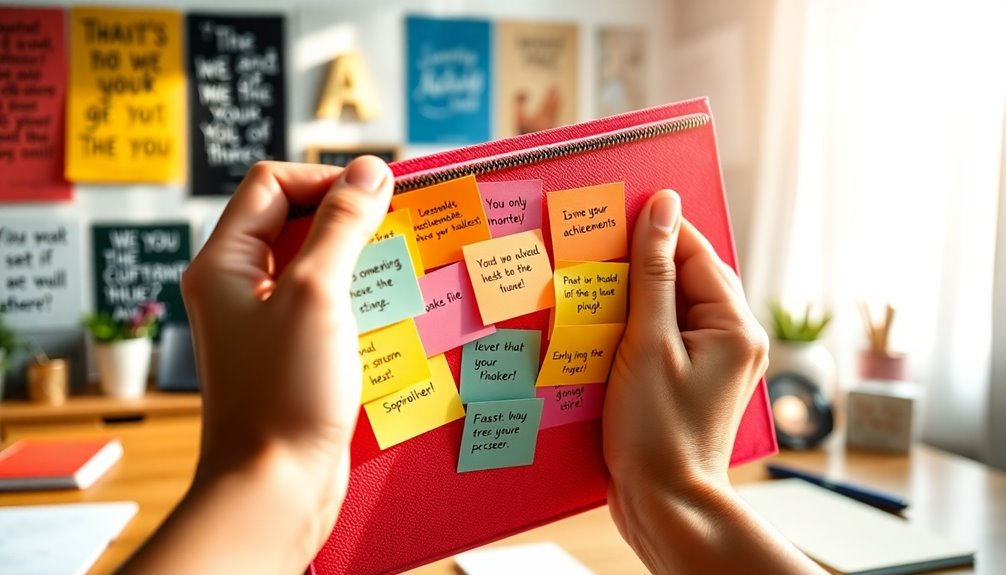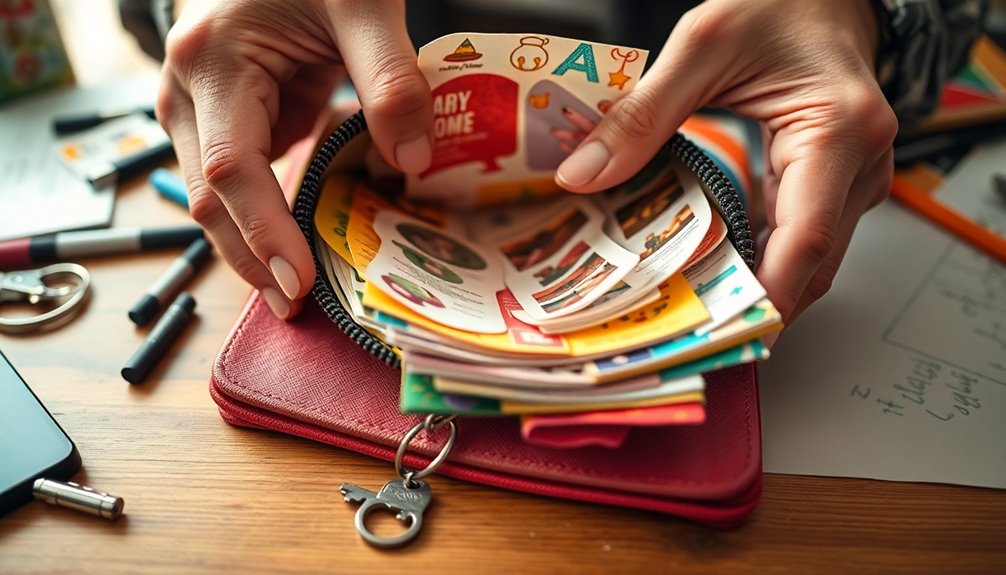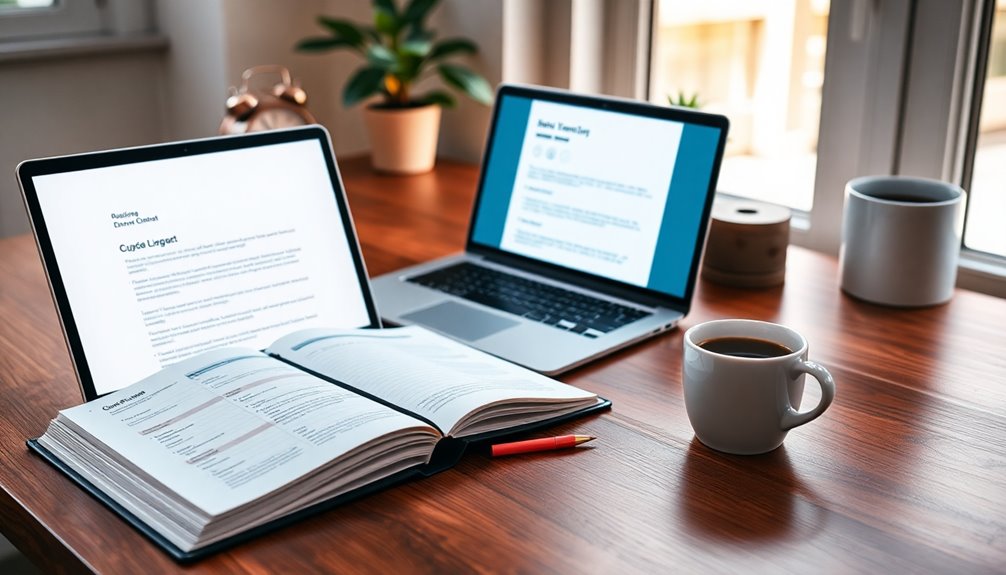Revealing secrets beyond your resume means presenting your true self and potential to employers. It starts with tailoring your responses to align with the job role, using keywords and language from the job description. Instead of repeating what's on your resume, focus on compelling stories and significant achievements that highlight your skills and motivations. Choose experiences that demonstrate your strengths and relate directly to the position you're pursuing. By articulating a clear past, present, and future, you create a powerful narrative that captivates interviewers. There's much more to discover that can enhance your approach and effectiveness.
Key Takeaways
- Tailor your responses to highlight experiences and skills that align with the specific job description and company culture.
- Use storytelling to illustrate your achievements and professional motivations rather than simply listing past duties.
- Focus on quantifiable results and problem-solving examples that directly relate to the position you're applying for.
- Analyze job descriptions for essential skills and incorporate relevant keywords into your narratives.
- Prepare insightful questions about the company to demonstrate genuine interest and understanding of its goals and values.
Importance of Tailoring Responses

When preparing for an interview, the art of tailoring your responses can make all the difference in creating a memorable impression. You should recognize that interviewers may not thoroughly review resumes beforehand, so customizing your answers is essential.
Focus on highlighting skills and experiences that align with the specific role and employer. Job postings offer valuable clues about desired qualifications, helping you prepare relevant talking points. By incorporating language from the job description, you demonstrate alignment with the company's needs.
Additionally, researching the company culture allows you to ask insightful questions, showing genuine interest. Ultimately, tailored responses not only capture attention but also showcase your suitability for the position, setting you apart from other candidates. Moreover, utilizing data-driven marketing strategies can enhance your understanding of what employers are looking for in potential hires.
Structuring Responses Effectively

A well-structured response can greatly enhance your interview performance. Aim for clarity by using a present, past, future format. Start with your current role and relevant responsibilities, then share past experiences that shaped your career, and finally articulate your future aspirations aligned with the company's goals.
| Current Role | Past Experience | Future Aspirations |
|---|---|---|
| Describe your current responsibilities. | Share a significant achievement or challenge. | Explain how you see yourself growing with the company. |
| Highlight skills gained. | Discuss lessons learned. | Connect your goals to the company's mission. |
Keep your answers concise, avoiding a chronological life history. This approach keeps the interviewer engaged while showcasing your skills and values effectively.
Avoiding Resume Repetition

How can you make your interview responses stand out without simply reciting your resume? Focus on telling a compelling story that highlights your accomplishments and results. Instead of listing duties, share professional motivations and how specific experiences shaped your career.
Avoid starting with personal details like "I was born in…" and instead, dive right into relevant achievements that connect to the job at hand. Keep your narrative concise, emphasizing how your skills align with the company's mission.
This approach keeps the conversation engaging and informative, allowing the interviewer to see your value beyond the paper. Additionally, consider using SEO-focused online courses to enhance your knowledge and storytelling abilities. Remember, it's about creating a memorable impression, not just repeating what's already on your resume.
Selecting Valuable Experiences

Selecting valuable experiences for your interview responses is essential in showcasing what makes you unique as a candidate. Focus on moments that highlight your strengths and align with the job requirements.
Consider experiences that set you apart, such as leadership roles, problem-solving scenarios, or instances where you exceeded expectations. These stories should demonstrate not only your skills but also your adaptability and commitment to growth.
Use specific examples to illustrate your points, ensuring they reflect the qualities the employer values. By connecting your experiences to the position, you present a compelling narrative that resonates with the interviewer, reinforcing your fit for the role and the organization's culture. Additionally, showcasing your emotional intelligence can further enhance your appeal as a candidate by demonstrating your ability to navigate interpersonal dynamics effectively.
Relating Skills to Position

Often, candidates overlook the importance of clearly relating their skills to the specific position they're applying for. To stand out, you need to connect your experiences directly to the job requirements.
Start by analyzing the job description, identifying keywords and phrases that highlight essential skills. Use these to frame your responses during interviews.
When discussing your background, focus on experiences that showcase those relevant skills and demonstrate how they align with the company's needs.
Share specific examples that illustrate your expertise and how you can contribute to the team's success. This connection not only shows your suitability for the role but also reflects your understanding of the company's goals, making you a more compelling candidate. Additionally, consider how developing a retirement savings plan can demonstrate your long-term commitment to financial responsibility and stability.
Follow-Up Etiquette

A timely follow-up after your interview can greatly impact the hiring manager's perception of you.
Send a thank-you email within 24 hours, and make it personal by referencing specific topics you discussed. This shows you were engaged and appreciative of the opportunity.
Reinforce your enthusiasm for the position and the company, but keep your message concise and professional. A well-crafted follow-up can set you apart from other candidates, demonstrating your commitment and attention to detail.
Remember, this is your chance to reiterate why you're a great fit, so don't miss it.
Body Language Tips

Effective body language can greatly influence the impression you make during an interview. Maintain eye contact to show confidence and engagement.
Use an open posture—avoid crossing your arms, as this can appear defensive. Instead, keep your hands visible and relaxed, using them to emphasize points when appropriate.
Mirror the interviewer's posture subtly; this builds rapport and creates a connection. Remember to smile genuinely; it fosters a welcoming atmosphere and demonstrates enthusiasm for the opportunity.
Avoid fidgeting or distracting movements, as these can undermine your confidence. Finally, be mindful of your facial expressions, as they should reflect interest and positivity. Additionally, maintaining high vibrational energy during the interview can enhance your overall presence and attract desired outcomes.
Frequently Asked Questions
How Should I Dress for an Interview?
When you're preparing for an interview, dressing appropriately is key. Aim for professional attire that aligns with the company's culture—business formal for corporate settings and smart casual for startups.
Verify your clothes are clean, pressed, and fit well. Pay attention to grooming; neat hair and minimal accessories can make a positive impression.
What Common Mistakes Should I Avoid During Interviews?
During interviews, don't let nerves turn you into a deer in headlights.
Avoid common mistakes like rambling on about irrelevant details or failing to tailor your responses to the job.
Don't forget to research the company culture and values, so you can connect your experiences to their needs.
Remember, maintaining eye contact and a confident posture shows you're engaged.
Finally, steer clear of personal topics that don't relate to the position.
How Do I Handle Difficult Interview Questions?
When handling difficult interview questions, stay calm and take a moment to think before responding. It's okay to ask for clarification if needed.
Use the STAR method—Situation, Task, Action, Result—to structure your answer clearly. Focus on relevant experiences that showcase your skills and resilience.
Acknowledge the challenge, but emphasize how you overcame it. This approach not only demonstrates your problem-solving abilities but also reflects your fit for the role.
What Should I Research About the Company Before the Interview?
Before your interview, dig deep into the company's mission, values, and recent achievements. Understanding their culture and priorities can spark your enthusiasm and help you connect on a personal level.
Look at their products, services, and industry reputation, too. This knowledge not only prepares you for insightful questions but also shows your genuine interest.
When you align your experiences with their goals, you're setting yourself apart as a candidate who truly cares.
How Can I Improve My Interview Confidence?
To improve your interview confidence, practice answering common questions and tailor your responses to the job.
Prepare by researching the company and understanding its culture. Rehearse with a friend or in front of a mirror to refine your delivery.
Focus on your achievements and how they relate to the role. During the interview, maintain eye contact and use positive body language to convey confidence.
Conclusion
As you step into that interview room, remember: your resume's just the beginning. Picture the possibilities as you weave your unique story, enchanting your interviewer with tailored responses and genuine passion. What if you could leave them not just impressed, but enthusiastic to bring you on board? With your newfound strategies, you're on the brink of transforming your approach and standing out. So take a deep breath—your dream job is just a conversation away. Are you ready?
Eugene brings a fresh, dynamic voice to our platform as one of our talented Writers. Specializing in research-driven content, he explores the latest findings in psychology and personal growth, translating them into actionable insights for our readers. Eugene’s work is fueled by a curiosity about what makes us tick and a desire to help others unlock their potential.










